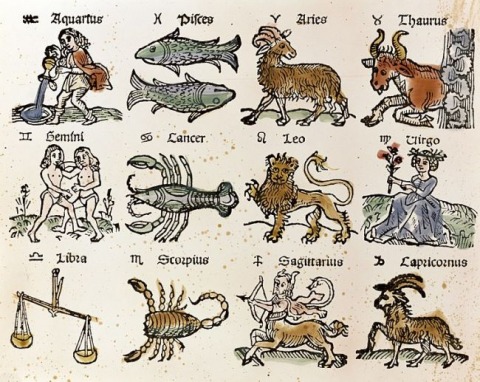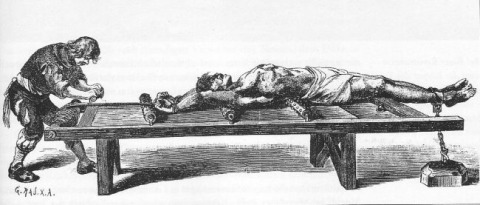
The Underground Thomist
Blog
Devices and Desires of the HeartMonday, 08-29-2022
Query:In the Speculum Astronomiae, one of the works attributed to Albertus Magnus, who was one of Thomas Aquinas’s teachers, Albert argues that astrology can perfect free will. I take this to mean that it’s good to go with the flow. My question is, at what point does an astrologer interfere with the will of God?
Reply:I’m glad to answer your question, but I’ll also address whether you’re right about going with the flow. No one can interfere with the will of God, because God is omnipotent. However, one can oppose the will of God, and this is sin. One of the things God has willed is that we humans possess the power to deliberate and choose. So even though we come under various influences, we are not pawns of fate, and must not treat ourselves as though we are. The early astrologers believed that we are pawns of fate. Paradoxically, though, they thought that they could somehow manipulate fate by knowing what was fated. This view is incoherent, because if everything is fated, then any attempt to manipulate fate is itself fated. Although I think Albertus Magnus was mistaken to believe that astrology is a true science, he was not of that poisonous sort. In fact, his argument about the perfection of free will was intended against the vicious fatalism of the astrologers. Rather than using the celestial bodies for fortunetelling, he hoped to use them as a source of information about the influences that operate at birth on our personal inclinations and dispositions. The idea was that if we want to become good people, then we must be on guard against the devices and desires of our hearts. So what did he mean by perfecting the will? He meant resisting the temptations, and uprooting the vices, that prevent the full flowering of virtue. This isn’t going with the flow. It’s the very opposite of going with the flow. As it turns out, astrology doesn’t reveal our personal dispositions and inclinations after all. Leos aren’t fierier. Virgos aren’t gentler. Pisces aren’t more affectionate. However, we don’t have to be astrologers to recognize that we have personal dispositions and inclinations – and the principle that we should understand them in order to guard against wrongdoing is a good one.
|
So You Want to Be a ScholarMonday, 08-22-2022
Query:If you have any advice at all for someone wanting to pursue a PhD and potentially become a humanities teacher or professor, I'd love to hear it. I know there aren’t many job openings in the humanities.
Reply:Sure. First, I’d suggest that you cultivate an entrepreneurial attitude. What I mean by that is that you will have to adjust rapidly to new conditions, be willing to try new venues for teaching and scholarship, and be prepared for the fact that even if teaching is your first calling, it might not be how you earn your salary. I say this not because there aren’t many job openings in the humanities – although that’s true too – but because colleges and universities are changing radically. The present model of colleges and universities is failing, for in the first place they have forgotten or even turned against their original mission; in the second, they have picked up a whole lot of unrelated sidelines, none of which they do very well, such as universal job certification; and in the third, the public is beginning to catch on that they cost far too much, and that other institutions can usually do each of these sidelines better. Barring root and branch reform – for which we must never give up hope -- it’s entirely possible that in the not-so-distant future, serious humanities teaching will have to migrate to other settings than colleges and universities. So you must be sure of your principles and calling – and although you must not give them up, in other respects you must be willing to adapt and learn new ways to communicate. Second, since you are writing to me and I am a notorious out-of-the-closet Christian, you may be a person of faith. If so, you should recognize that the contemporary university is unfriendly to faith. It isn’t so much that you aren’t allowed to believe in God, as that if you do believe in God, you are expected to act, study, and teach as though He doesn’t matter to anything else -- and, in particular, that He couldn’t possibly have any objection to the contemporary woke agenda, which aims at capturing the humanities for narrow and sometimes insane political purposes. This doesn’t mean that a person of faith can’t succeed in the contemporary university, but that in order to get a hearing, he is going to have to be try to be three times as good as the wokeists and secularists, and he must expect to be treated at times like an Enemy of the People (or at least of the Smart People). Then again, it’s very much like that now in big corporations, in government, in unions, and in most of the professions too. Have charity, but be tough and have courage. Is this discouraging? I hope not. You can think of it as a trumpet call. And I have a third suggestion too. I urge you to study the humanities not just as a field of knowledge, but as a way of life in pursuit of wisdom. If it’s just a job, you may as well sell vacuum cleaners. Be joyful! Do well!
|
May We Do Wrong to Wrongdoers?Monday, 08-15-2022
Query:I believe that using torture as punishment is wrong, but I have difficulty pinpointing why. The argument I find strongest is that torture is wrong because it completely subverts the intellect and will, essentially reducing turning a human being into a nonrational animal. This makes sense, but let's say a criminal is convicted for a ghastly crime that essentially subverted the will and reason of his victim. Wouldn't he deserve that the same thing be done him? Another argument is that torture must not be used for punishment because of what it does to the torturer. But one could easily think of some contraption or machine which carried out the punishment instead of a human being.
Reply:Thanks for your letter. There is nothing wrong with either of the two arguments against torture that you mention. In terms of proportionality alone, it might at first appear that someone who vivisected should be vivisected, someone who raped should be raped, and so forth. However, intrinsically evil acts cannot be justified even if they are done for the sake of some good, such as retribution. The guiding principle, which is an axiom of both natural law and Scripture (Romans 3:8), is that we must never say “let us do evil so that good will come.” And yes, not only would the person who committed an intrinsically evil act for the sake of retributive punishment be guilty of grave sin, he would distort himself inwardly by his deed, just like the person he is punishing. It would make no difference whatsoever – certainly not morally, and probably not even psychologically -- if the punisher used a contraption or machine to commit the evil acts, because the agent of the punishment would be him, not the machine, even if all he had to do was turn it on and watch it work. If this were not so, then a person who murdered by using a gun would be able to say “I’m innocent, because I didn’t kill the fellow – the gun did!”
|
DemolitionMonday, 08-08-2022
Naïvely, the Roe Court didn't expect many abortions. Yet legalization unleashed a gushing deluge of them. Though Roe itself has been rescinded, it will take a lot longer to sponge from the nation’s ravaged conscience the red stain of legally slaying 63 million babes who were still in their mothers’ wombs – not to mention those who are still being slain. Since 2015, we have been on another long march. The Obergefell Court didn't expect much disturbance in norms and customs. Yet endorsement of homosexual “marriage” opened the gates to a swiftly rolling juggernaut. The violation of women’s dressing rooms, lavatories, and sports, the invasion of library and school story times by drag queens, and the administration of powerful hormones to children without even telling the parents – these things are spreading, and they are just the beginning. Go ahead and knock down those load-bearing columns. They don’t do anything. Nothing will happen, don’t you see? Everything stays up by itself. Nothing is connected with anything else.
|
Life After Roe for Pro-LifersMonday, 08-01-2022
The pro-life movement has always promoted the well-being of mothers and children in general -- not just of children in the womb. Even after the demise of Roe v. Wade, killing developing babies remains legal in many states, so protecting their lives is still crucial. But in places where their lives are already protected, the spotlight will shift even more to helping mothers and children in general. This change may unearth a latent faultline even among the ranks of the pro-life movement: For how should the well-being of mothers and children be promoted? Some pro-life folk may assume, like many politicians, that the best thing to do for women with children is to throw money and benefits at them. Others, reasoning that it is in the best interests of women with children to marry the father rather than the government, and that a culture of dependency keeps people in poverty forever, may assume that the one thing necessary is to encourage sexual restraint, stable marriage, paid employment, responsible parenting, and loving family life. Both sides are partly right. The latter approach is obviously more fundamental; the sexual revolution has disordered families, impoverished women, and done grave injury to children, and the wrong kind of material incentives can generate further disorder. But just as obviously, women in trouble need some material assistance. Their children need doctors. Deadbeat dads need to be traced and required to contribute support. Mothers with small children should be free to care for them; they should not be expected to chuck them into daycare and go off to work themselves. The difficulty is to distinguish between forms of “help” that help, and forms of “help” that hurt. This may seem a purely sociological puzzle. It isn’t. What makes the problem difficult is that there are strong vested interests in favor of answering it the wrong way. Corporations don’t want their employees to be distracted; they want women to be free from the competing responsibilities of family life. Social work bureaucrats aren’t interested in working themselves out of their jobs; they want a permanent clientele. If they see the poor at all, politicians see them as political dependents; they want voters who can be bribed. And too many churches would rather give handouts than involve themselves in the messy business of bringing people into the community, bringing order to their lives, and helping them get on their feet. To say these things isn’t cynical. It’s just life. If we really want to help people, we had better remember original sin.
|
On Getting What One Asks ForMonday, 07-25-2022
The Atlantic says pro-abortion protesters who chant “Hail Satan” aren’t really hailing Satan, but only mocking religious people. The Atlantic is naïve. To be sure, the chanters are baiting religious people, but they are not mocking them. One mocks people by making their cause seem ridiculous. One does not make their cause seem ridiculous by portraying one’s own cause as evil. I haven’t the slightest doubt that not everyone who chants “Hail Satan” really thinks that he is hailing Satan. Yet he is doing it. If he is not adoring the prince of the powers of darkness, then he is saluting the supreme symbol of these powers. He is celebrating the commission of evil to spite God. Christians are sometimes told that they should be careful what they pray for, because they may get it. This is good advice for abortion proponents too. If they hail darkness, it will come to them.
|
Masculinity Isn’t Toxic to Women -- Feminism IsMonday, 07-18-2022
Men are stronger and more aggressive than women, but the difference lies not just in faculty. Men want to use their strength. Bemoan the fact if you will, but if they don’t use it to protect others, they will probably use it to take advantage of them. Given this fact, the obvious and natural way to keep men from taking advantage of women is to teach them chivalry. Don’t suppress their manhood, ennoble it. Don’t tell them not to act like men, tell them to act like proper men. Teach them that the right use of strength is to cherish, protect, and assist the weaker sex. The opposing theory thinks the problem isn’t debased masculinity, but masculinity. To keep men from taking advantage of women, denature them. Don’t ennoble their manhood, demean it. Teach them that offering protection or assistance to women is insulting, regressive, and condescending. This anti-chivalric regimen doesn’t keep men from taking advantage of women, but only makes them irresponsible louts. It teaches them to view women not as ladies, but only as possible lays. It replaces the culture of marriage and fatherhood with a jungle of hookups, and tells women that if they don’t like it, there must be something wrong with them. You don’t make men good men by telling them how poisonous they are for being men.
|






